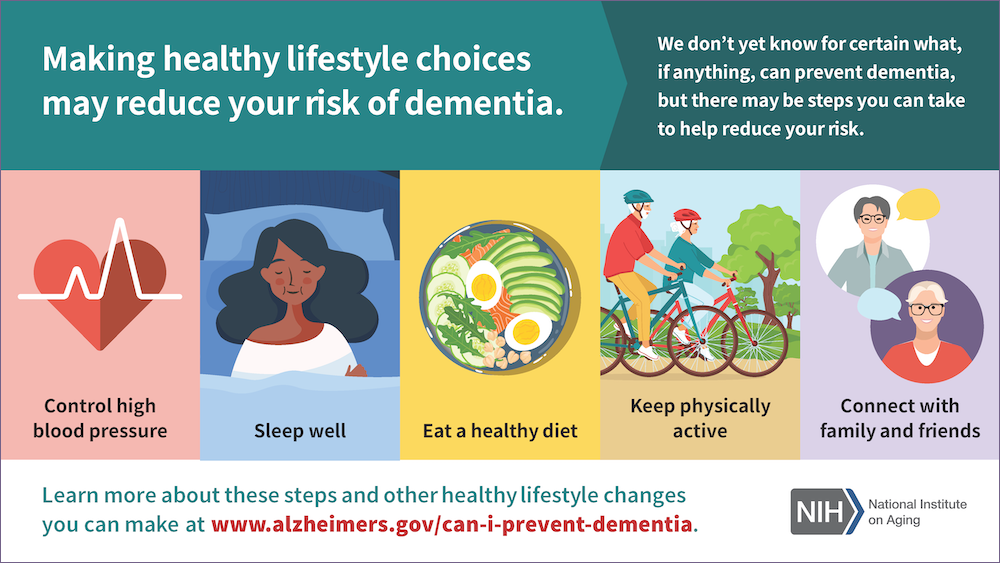Early detection and treatment are important to fighting Alzheimer’s disease. Three recent studies offer promising developments in identifying, preventing and potentially treating Alzheimer’s.
Blood tests for amyloid beta detection
Researchers are actively developing ways to diagnose Alzheimer’s earlier. Abnormal amyloid beta and tau proteins are typical in Alzheimer’s brain pathology. Positron emission tomography (PET) imaging and cerebrospinal fluid (CSF) analysis are methods for the detection of these pathological features. Now, blood tests are being developed and tested to offer less invasive, less expensive, and more accessible ways to diagnose Alzheimer’s disease.
A study published in Alzheimer’s and Dementia evaluated a commercially available blood test called PrecivityAD2. This test analyzes a combination of biomarkers in the blood to predict the presence of amyloid beta plaques in the brain, a hallmark of Alzheimer’s. This study involved 583 people with suspected Alzheimer’s disease. The study showed the test to be highly accurate with 88% agreement with amyloid PET scans.
Another study published in JAMA Neurology evaluated ALZpath pTau217, a commercially available immunoassay, to identify Alzheimer’s disease pathology. Participants included individuals with and without cognitive impairment grouped by amyloid and tau status using PET or CSF biomarkers. The study reported that the p-tau217 immunoassay showed similar accuracies to cerebrospinal fluid biomarkers in identifying abnormal amyloid beta and tau pathologies.
As diagnostic tools for Alzheimer’s disease become more widely available, they can help to identify patients suitable to receive approved therapies and expedite enrollment of participants with confirmed amyloid pathology in clinical trials.
Sildenafil for Alzheimer’s prevention and treatment
Sildenafil is the main ingredient in Viagra® – commonly used for erectile dysfunction – but has more recently shown promise as a treatment for Alzheimer’s disease. In a 2020 review, the authors noted that sildenafil reversed some of the physiological changes that occur in the brain of Alzheimer’s patients.
A recent study published in the Journal of Alzheimer’s Disease investigated the potential of sildenafil to reduce Alzheimer’s risk. It was a retrospective observational study, meaning it analyzed existing data rather than conducting a controlled trial. Researchers used insurance claims data to identify individuals who used sildenafil compared to those prescribed other medications.
The study found that men who used sildenafil appeared to have a significantly lower risk of developing Alzheimer’s. Additionally, lab experiments on cells derived from Alzheimer’s patients showed reduced tau levels and improved blood flow and cell function with sildenafil treatment.
While intriguing, this is preliminary research. Controlled clinical trials are needed to confirm these findings and explore the safety and efficacy of using sildenafil specifically to prevent (or treat) Alzheimer’s. It’s crucial to consult your doctor before taking any medication for potential Alzheimer’s prevention.

Improving mild cognitive impairment with lifestyle changes
A healthy lifestyle goes a long way to preventing many diseases, including Alzheimer’s disease and dementia. A recent randomized clinical trial sought to determine if exercise, cognitive training and/or vitamin D supplement could improve cognition in individuals with mild cognitive impairment.
The results from the SYNERGIC study were published in JAMA Network Open. Participants included 175 Canadian adults aged 65 to 84 years who were assigned to one of five groups with combinations of aerobic-resistance exercise, computerized cognitive training, and vitamin D supplements.
After 20 weeks, exercise with cognitive training significantly improved cognition scores, driven by improvements in memory, attention, and orientation. The effect was still evident after 12 months. Exercise alone did not improve cognition, nor did adding vitamin D.
The authors noted that the multidomain intervention of physical and mental exercise could induce a meaningful cognitive improvement in individuals with mild cognitive impairment, which may have important implications for their quality of life.
Lifestyle changes such as these can be adopted by most people and improve many aspects of lifelong health.
Conclusion
Although there’s no cure for Alzheimer’s yet, these studies offer promising advancements for both early diagnosis and potentially preventing the disease. While some options require further research, maintaining a healthy lifestyle remains one of the most effective ways to promote brain health at any stage of life.
Here are some steps you can take to maintain brain health:
- Prioritize a healthy lifestyle: Regular exercise, a balanced diet, and good sleep are all crucial for brain health.
- Manage chronic conditions: High blood pressure, diabetes, and obesity are all risk factors for Alzheimer’s.
- Stay mentally stimulated: Challenge your brain with puzzles, games, and learning new things.
- Maintain social connections: Social interaction is important for cognitive health.
Visit our pages on Alzheimer’s disease prevention for more tips and information on how the Parsemus Foundation is supporting research on Alzheimer’s disease and dementia.



